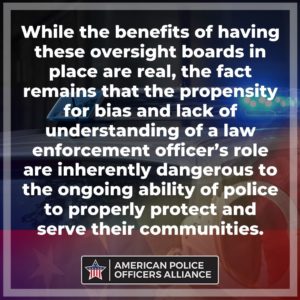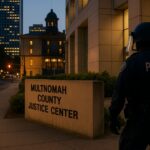Police Oversight Boards should be unbiased towards police officers and include vetting procedures for any potential members. When in doubt, oversight boards should defer to officer internal reviews and actions.
Clashes of opinion have long plagued the relationship between law enforcement and the civilians it protects. Dating back to the 19th and early 20th centuries, much discussion has centered around the concept of transparency and accountability when it comes to law enforcement. Civil unrest and racial tensions that dot the historical timeline have also been a cause of mistrust between police officers and civilians, which has led to a marked increase in the implementation of civilian oversight boards or police accountability boards around the country. Today, over 150 civilian oversight boards exist with the intent to increase the levels of accountability — but these boards have come at a cost. In some areas, the boards have done more harm than good in terms of mistrust levels and tension. While the benefits of having these oversight boards in place are real, the fact remains that the propensity for bias and lack of understanding of a law enforcement officer’s role are inherently dangerous to the ongoing ability of police to properly protect and serve their communities.
Three types of oversight boards are currently employed in various jurisdictions around the country. According to recent research done by the National Association for Civilian Oversight of Law Enforcement (NACOLE), the majority of surveyed boards adhere to a Review based model. These boards are most often voluntary and not full-time or paid positions. This model offers a higher level of community input as officer conduct complaints and their subsequent investigations are often made available in the name of transparency. However, because of the voluntary nature of this model the risk for bias and, at the least, a lack of general training and knowledge on the inner workings of law enforcement is causing increasing turmoil.
The powers of civilian oversight boards are limited and often their recommendations go unimplemented; 45 percent of the boards surveyed by NACOLE do not have any current statutes or ordinances requiring law enforcement officers to cooperate with the oversight boards. In the implementation of oversight boards, the importance of transparency and accountability goes both ways in order for the system to be beneficial to both sides. The struggles that oversight boards are presented with include lower budgets, civilian and police mistrust, and a lack of enforceable action.
While the benefits of oversight boards do exist, there are several instances of these boards not achieving the desired effect. Take the example of the city of Chicago, which was one of the early adopters of the oversight board and police accountability initiatives in the wake of heightened racial tensions. One of the most repeated issues that law enforcement often has with these oversight boards is the lack of knowledge and formal training that the board members may have. Remember, most oversight boards in the U.S. consist primarily of volunteers. This serves multiple functions, but one such function is to exist on a lower budget that does not need to pay staff salaries. However, because of the voluntary nature of many of these positions, this often means that the board members have little-to-no experience in law enforcement. This lack of understanding can make it difficult to grasp the protocol followed by police officers and the training that they undergo to handle tense scenarios. And because of this lack of knowledge, the members of a civilian oversight board may have difficulty accepting that police protocol has been put into place after decades of research and implementation.

This leads to an overall feeling of unease. Another potential downfall, and a dangerous one, is that the law enforcement officers don’t always feel a sense of accountability to these boards. Instead, they feel resentment at being told how to do their jobs or that changes should be implemented that would actually have devastating effects down the road. “Because you had this separate entity responsible for evaluating and dealing with complaint reports, it’s almost like it let the department off the hook,” former federal prosecutor Sharon Fairley said in an interview with Governing. “They felt like, ‘Oh, we don’t have to worry about that because it’s IPRA’s job.’ They didn’t have the sense of needing to hold themselves accountable. They felt like they had this external entity doing it for them.”
In addition, these oversight boards, designed to increase levels of civilian trust, can actually lead to a heightened sense of mistrust. In many cases, civilians feel that they do not have a strong enough voice when it comes to voicing concerns about the actions of police officers. When an oversight board is subject to political manipulations — when a board has government-appointed members that may be susceptible to bias or manipulation, for example — the outcome can be disastrous and can drive an even deeper wedge between the public and the police tasked with protecting its members.
According to information from PBS, oversight boards have track records of slow-moving investigations, inadequate funding, and lack of staff. Additionally, criminal justice experts feel that the boards’ propensity for political bias and manipulation makes it easier to be skeptical of their usefulness.
And yet, many voters are making their intentions clear by voting for increased budgets and increased powers held by oversight boards. This is an alarming trend, as it seems that many boards are now populated by activists and those holding anti-police opinions.
The levels of police transparency and accountability must be kept high, this much we know to be true. In an age where tensions are high between civilians and police officers, there could be a use for police oversight boards, but only when done fairly and without bias or undue influence. If these voter trends continue, law enforcement may be in for a rough period. Yes, we must ensure that police operations are accountable to the public they protect. However, having activists on civilian boards can do more damage to the internal processes and criminal justice success of the police department.
Recommendations from research conducted by NACOLE include opting for the “best fit” and not the “best practice” concept. This simply means that not every jurisdiction will find that protocol always falls into “best practice”, and therefore each jurisdiction must be flexible in finding the best fitting solution for problems going forward. NACOLE also recommended conducinting ongoing research on the impact of oversight boards on civilian trust levels as well as more standards for measuring performance and effectiveness. Ensuring that oversight board members are fairly appointed, unbiased, and balanced is another way forward to ensure that police officers are still able to perform their duties effectively. Without these changes, the law enforcement environment faces more division, less trust from both the public and the police, and potential for limitations on power and authority, which could put law enforcement officers into life threatening situations. There is a path forward, but it must be unbiased, for the sake of the safety of our police officers.
In many areas, citizen mistrust of police officers is extremely low, which creates tension and clashes. The oversight committees want to help bridge this gap and create a more trusting and safe environment for all involved. But do these committees actually work? Find out here.










